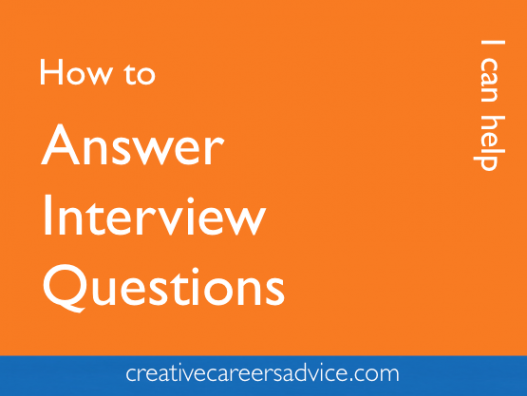Employers focus on any number of searching questions in their quest to find the right candidate to fill the role they are advertising for. Many of these questions fall under the category of: 'competency questions'.
So being aware of what they involve and the type of answers interviewers expect to hear is key to a successful interview. This blog aims to help you understand the thinking and process behind these types of questions and employers expectations.
'Competency' Questions - What are they?
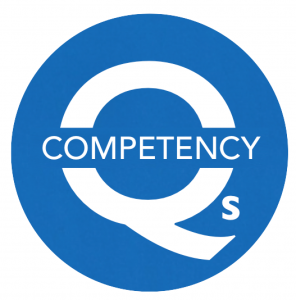 The official meaning: “A structured series of questions aimed at eliciting behavioural information against specific job-related criteria or competencies.”
The official meaning: “A structured series of questions aimed at eliciting behavioural information against specific job-related criteria or competencies.”
In other words: asking questions about when you’ve used key skills in different situations - so it's not just about you, it's you in relation to the job requirements.
What employers say about competencies:
“Job performance requires a mixture of personality, attitude & action…”
“Competency questions measure knowledge, skills, abilities and behaviours essential to successful job performance”
Perhaps for creatives the questions about your creative and technical abilities are easier to answer. These are commonly described as: vocational skills - creative & technical skills you possesses in certain fields.
The interpersonal ones may be tougher to respond to... as interviewers will want to evaluate things like your:
- People Orientated Skills - communication, empathy, organisation and teamwork.
- Self Management Skills - self-learner, pro-active, multitasker, organised, entrepreneurial.
So start to assess your interpersonal qualities alongside those createch skills, don’t assume a highly technical job spec won’t include questions about your soft/interpersonal skills too. And consider how you might answer these questions using evidence-based scenarios... and remember:
"Be yourself; everyone else is already taken." Oscar Wilde
The importance of interview techniques lives and dies in creating a good initial impression. No company wants to higher someone they don't like. These more empathic people already have the ability to develop and establish harmonious professional relationships and empathise with audiences.
 Consider what this statement means:
Consider what this statement means:
The best candidate doesn’t always win the job
The candidate who interviews the best does
It suggests that while your creative and technical skills are essential requirements; presenting and communicating them effectively and creating the right impression generally wins the day.
More and more the emphasis is on finding the person with the right personality and yes - whether your a nice person, is key. How simple that sounds, but quite a challenge in practice. Creating the right impression takes skill and understanding who we are and how we behave around others and in the workplace. This blog will help you create that balance.
So when preparing for interview, remember to consider a more holistic approach, bringing these 3 essential areas of skills to the table and ensuring your responses to interview questions have been given equal importance across these skills:
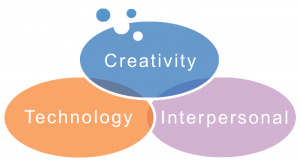
Familiarising yourself with common competency questions will also help you answer the complex ones more successfully. Preparing in-depth answers for interviews is the number one most useful action you can take...
Interviewers will most likely use open questions (where your expected to provide more than a 'yes' or 'no' answer), to discover real-life scenarios - demonstrating you used your competencies to the best effect. Look at the following examples:
“What motivates you” You are spurred on by challenges to learn, contribute, improve and succeed.
“What’s your greatest strength?” Be specific in relating accomplishments, successes & skills to the job specification.
“Do you have any weaknesses?” Don’t say ‘none”. Turn 1 or 2 negative examples into positive learning outcomes.
“Are you OK working overtime?” A non committed approach: “I agree to deliver what is needed”, demonstrates you are not the type to clock watch.
“Tell me about yourself” Relate answers to the position & elaborate, adding other but equally related experiences.
Let's look at a particular competency example like: Being A Team Player

Employers can look for all these values just within this one skillset:
Collaboration / Enthusiasm / Commitment / Creativity / Sense of Humour / Empathy / Stamina / Negotiation / Reliability / Honesty / Communication
Creating Your Specific Competency Scenarios
An interview will include various scenarios designed to test your knowledge, strengths and weaknesses aligned to particular areas of their business and disciplines.

The task is to build a memorable story around a particular personal example. Keep it concise, honest and relevant to the competency they want to hear about. Include some of the following examples:
- Roles and Activities - what you're interested in
- Achievements & Challenges
- Awards & Competitions
- Professional Relationships
- Decisions you have made and influenced
- Negotiations and Problem Solving
- Something extraordinary
The 'Creative Process' example. Understanding how agencies work and what their creative, production and client liaison processes are is a common expectation. So providing effective competency scenarios that demonstrate your understanding and skills in this area is key to providing effective answers.
In the example below - there are 9 core competencies across 3 key domains of team-based work, demonstrating specific skills and behaviours relevant to a creative production process.
Take note of the questions and language used below, what scenarios can you provide for each? Be sure to use similar words when constructing your answers.
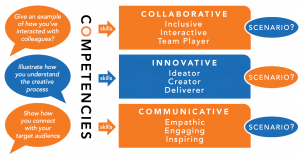
Here's a well known framework model 'STAR' to help construct that scenario and story arc.
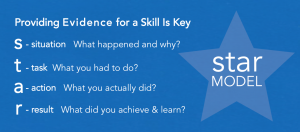
Below is a chance to test your ability to answer a common competency question - by using the example of a Junior Motion Designer role in a TV company:
Q: “Describe a situation where you’ve worked well in a team”
Situation - Assisted in the design, production and delivery of a multi-platform ‘health & safety campaign’ for all company staff.
Task - Worked within multi-skilled team, ensuring I understood the brief, the design, production and technical requirements and budget constraints.
*Action - Created brand design for a promotional campaign, videos, posters and interactive online site. Involved in client liaison, responding to feedback and delivery of final creative.
Result - Delivered all assets on time, within budget constraints and client expectations. Campaign won BDA UK, Best Promos Award.
* This is the most important part of the story arc, details that will draw the most attention.
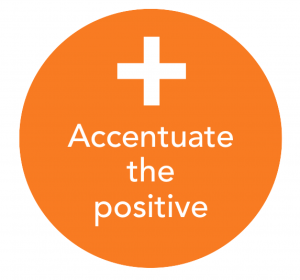
Always focus on using positive outcomes, highlighting what you learned.
"I enjoyed the challenge and felt good about coping and working in a team"
- Delivery of all creative assets was on time and within budget constraints.
- Secured further contracts from satisfied clients.
- Empathically working with others to understand their needs
- Showing I coped well in a difficult situation and learning some new software
- Adaptable & responsive to change
- Remaining calm and pragmatic
Conclusions
We have seen the importance of a holistic approach to answering competency questions, that include your creative, technical and interpersonal skills and behaviours where possible.
The answers provided within a framework make your skills and experiences clearer, concise and ensures it incorporates a wide range of the holistic skills from creative, technical to interpersonal (soft). It demonstrates your professional approach to the interview procedure and can impress and help exceed employers expectations. By creating a story arc around each competency scenario they become much more memorable and effective answers.
“Competency questions measure knowledge, skills, abilities and behaviours and are essential to successful job performance”
Action point: Why not have a go at considering the following competency questions and constructing strong, in-depth scenarios you can use in future interviews and networking opportunities.
“Why did you apply to us?” Describe how your skills, creativity and interests demonstrate you are the right match & person/personality for the position.
“What are your career plans?” Focus on professional goals and a timeline, but ensure it also relates to the position that you are applying for.
All photographs in this blog are courtesy of: Unsplash – https://unsplash.com/
© Paul Butler is a Creative Careers Adviser, Design Director and HE Lecturer in employability and Creative Industry careers.
For one-to-one creative careers advice and coaching contact me at: paulb@creativecareersadvice.com
If you found this blog useful share it with your contacts and follow me for more posts on creative careers advice and employability topics.
